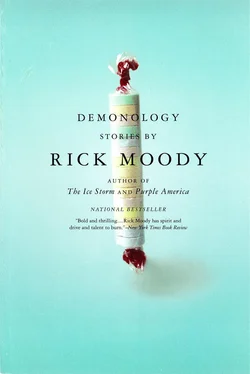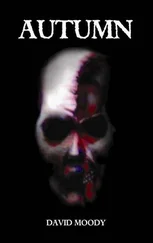Forecast from the Retail Desk
Nobody likes a guy who can foretell the future. Let me tell you. A guy with foreknowledge of events. Its like having really bad acne. I had that, too. You’ll need clinical trials probably. The bull market will come to an end, for example. Any idiot will tell you that, and yet a persuasive demonstration of my skills requires that I start small and build to a spectacular conclusion. The Dow, in spite of its reliance on blue chip issues, will chase NASDAQ’s tail down. My own employers will come face to face with some nasty accounting practices that lead straight to a cadre of cocaine-snorting, Lexus-driving tech-fund specialists. Then some really bad international loans will surface. Jesus, make a loan to Canada, or something. My position, here at the retail desk, where I am not well liked, will be one of the first declared obsolete in the merger. They’ll let me know first thing on a Monday, after I’ve been up for three consecutive nights, worrying about my brother’s kid, who has leukemia.
I tell my wife this stuff, she doesn’t believe me.
Here’s a historical account of the first ever public demonstration of my skills: I told Bobby Erlich that he was going to get paralyzed in a motorcycle crash. This was in 1977. Erlich didn’t like motorcycles or mechanical stuff of any kind. He had a tentative approach to the sciences, too, though we were sequestered there, in chemistry, at the pleasure of the New York State Board of Regents. The laboratory tables were always marbleized, always black, swept clean of hazardous accumulations. Songbirds in our town, New Rochelle, sang parochial songs, jingles, light fare. The windows were open. It was late autumn. The chemistry teacher, Miss Rydell, said, Bobby, you work with Everett here. No one else would work with me. Not even the two Hispanic kids. A pairing off had transpired, boys of incredible beauty with girls as perfect as in the Old Masters. What was my crime? Bobby Erlich, that blond, said nothing, accepted a glass beaker from Miss Rydell, shoved past me toward the lab station. At the beginning of the experiment, sodium and water in equal parts, I smiled genially at Bobby, thanked him for working with me, but this was simulated, because, when he still wouldn’t talk, wouldn’t collaborate, kept taking beakers away from me, I had no choice but to deliver his fate, which came to me with a sort of uncanny trembling that you associate with early stages of fever, as if foresight and shingles, or chicken pox, were identical: You’re going to get maimed in a horrible motorcycle accident. It’s really going to hurt, too. The part you can feel, anyway. Just remember we had this chat.
Know what, Bennett? said Erlich, Ialways thought you were a jerk. And I was right.
The exchange in its entirety. Two lines. Had I known what was going to happen I would have feigned illness and taken a city bus home, lugging my ring binder, my unused baseball glove, and the remains of my bag lunch. Why worry about the opinion of Bobby Erlich? I could just as easily have said something polite. Nevertheless, class proceeded without incident, almost like it was supposed to, despite discord between lab partners. Miss Rydell hummed as she circulated from lab station to lab station. We performed the experiment, I balanced the equation in my lab notebook — Erlich didn’t know how to do it — I passed our results to the front of the class. We got an A on the homework, and afterward Bobby avoided me wherever possible, especially in chemistry class. I would see the rear view of him in the cinder-block corridors, a faded red backpack retreating.
Eventually, Erlich turned out to be, well, gay, the preferred colloquialisms in those days being fag, mo, felcher, queer, and so forth. Foreknowledge of his blossoming condition would have been possible among my prognostications, though in truth I had a basis for my surmises, namely that Erlich had repeatedly been beaten and tortured by the lobotomized physical-education students of my school, most of whom are now plumbers with collections of child pornography taped inside their vans, or this seemed to be the implication at our recent twentieth reunion. Anyhow, I didn’t tell Erlich he was gay, I just told him he would be maimed in a motorcycle accident, and the year passed, and I was grateful every time I saw Bobby’s retreating backpack on the way to band practice, where he was first flute, or easing into the Green Room backstage at one of his beloved high-school dramas. (I was property master for several of the shows that year.) I was grateful because Bobby was intact.
Then we were seventeen (along with everyone else in our class except the aforementioned lobotomized physical-education students). An age of promise, an age of adventures, of intoxications, of epiphanies. Bobby Erlich the seventeen-year-old meanwhile seemed to be having an intergenera-tional romance, that was the rumor, and one night he was riding in an Olds Cutlass Supreme beside this off-duty policeman from our town, Officer Meineke, a policeman with a wife and kids who nonetheless had found himself all dizzy over a flute-playing, theater-obsessed boy from the junior class of the local high school. I’m conflating characters and scenes, you understand, in order to spare certain parties bad publicity. It was rainy. It was June. That intersection at Four Corners was, and is still, noted for scofflaws trying to make it to the station before the local train pulled out. Bobby and his policeman were locked in a kiss at a stoplight, a devouring kiss, and I would like to think that in spite of my robust heterosexuality I could render that kiss for you. The instant eclipsed all the years of Bobby’s woeful adolescence. It was interstellar. It was pantheistic. He wanted to see Meineke’s locker, at the police station. He wanted his own dog-eared photo of Meineke as a little boy.
However, as they were sundering themselves from this embrace and preparing for its duplicate, Joey Kaye’s father, who was coming home impaired from a nearby tavern, was trying to catch the tail end of a yellow traffic signal. Joey’s dad: thirty-eight miles per hour on a street zoned for thirty. In a Honda Civic. He struck the passenger side of Meineke’s Olds, and was uninjured, since drunk. Meineke, except for a few hematomas and his reputation, was also intact. Not so Bobby. Lots of witnesses could corroborate this account. Melissa Abdow, for example, was on the corner, eating mint chocolate chip in a sugar cone (it was dripping badly). She told me the next day. In math class. She had a sequence of images lodged in her brain, she said, like evidentiary photos: Bobby in the front seat of the car, smiling, then Bobby curled around the mashed engine of the Olds, which was right up in the front seat of the other car. Then the Jaws of Life.
I didn’t visit him in the hospital, since, like I say, he couldn’t stand me. But I should have visited him, because instead I was spending weeks in my room, gorging on remorse. I lay awake nights, debating with the dead white people of philosophy about my prophecy. Could it be true? Did language, when you petitioned with it, cause such devastations as Bobby’s crash? Did the stuff you mumbled on a bad day in chemistry class despoil a family of a policeman who happened to like boys, but who hadn’t yet told his wife, and was then undeservedly pulled mostly uninjured from the detritus of his car alongside the paralyzed body of an underage flute-player? Did I cause all that? It was supposed to be a joke! And, besides, I said motorcycle crash! If only I had played football, if only I had worn shoulder pads, worn that war paint of football players, if only some hulking alcoholic wife-batterer in the Pop Warner League had cared enough about me to make me feel like I was more than a barnacle at New Rochelle High, then I wouldn’t have had to do what I did; if only I had played football, and had heard, at the line of the scrimmage, the crunch in which my ownneck buckled, in which the ether above me gave way and the songbirds blew the play dead for now and always, if only I had heard the hoarse commands of stretcher-bearers.
Читать дальше












